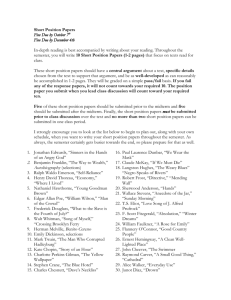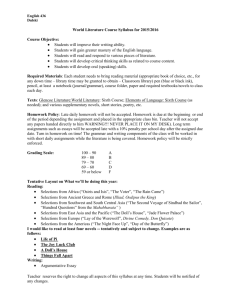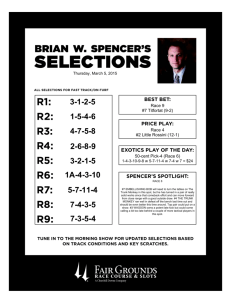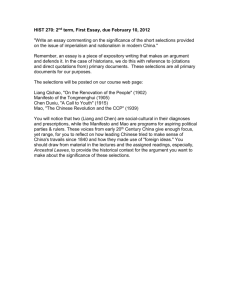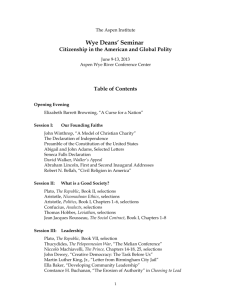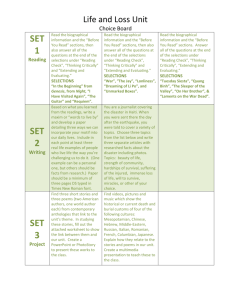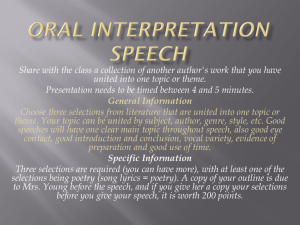Readings/Schedule - The Disaster Collaboratory
advertisement
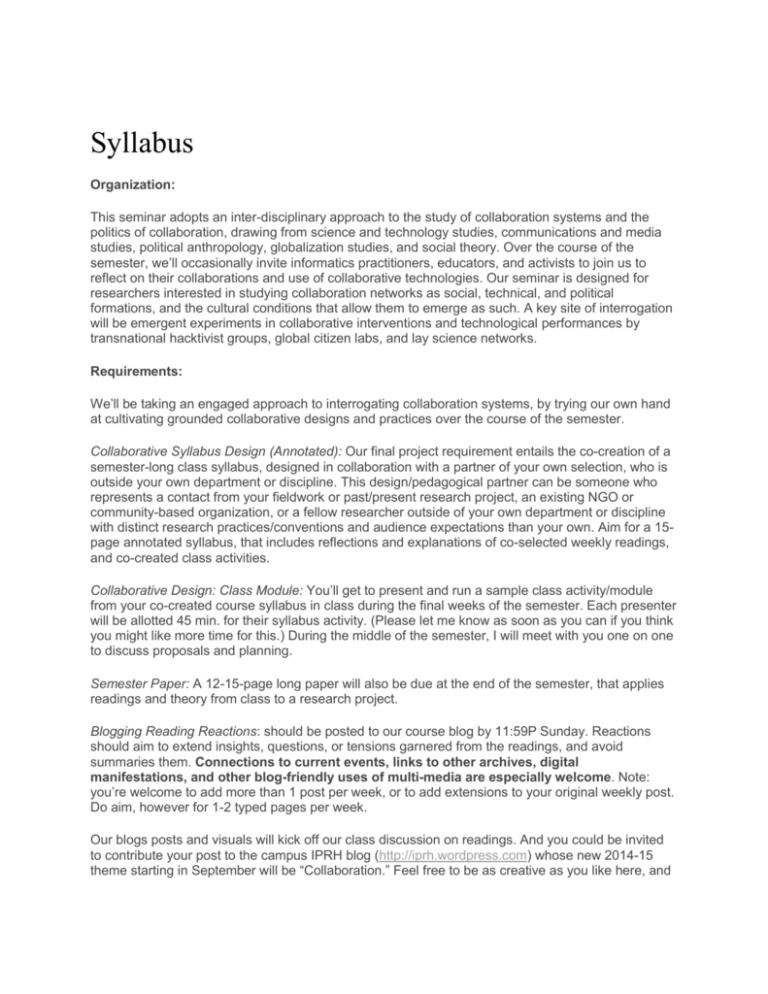
Syllabus Organization: This seminar adopts an inter-disciplinary approach to the study of collaboration systems and the politics of collaboration, drawing from science and technology studies, communications and media studies, political anthropology, globalization studies, and social theory. Over the course of the semester, we’ll occasionally invite informatics practitioners, educators, and activists to join us to reflect on their collaborations and use of collaborative technologies. Our seminar is designed for researchers interested in studying collaboration networks as social, technical, and political formations, and the cultural conditions that allow them to emerge as such. A key site of interrogation will be emergent experiments in collaborative interventions and technological performances by transnational hacktivist groups, global citizen labs, and lay science networks. Requirements: We’ll be taking an engaged approach to interrogating collaboration systems, by trying our own hand at cultivating grounded collaborative designs and practices over the course of the semester. Collaborative Syllabus Design (Annotated): Our final project requirement entails the co-creation of a semester-long class syllabus, designed in collaboration with a partner of your own selection, who is outside your own department or discipline. This design/pedagogical partner can be someone who represents a contact from your fieldwork or past/present research project, an existing NGO or community-based organization, or a fellow researcher outside of your own department or discipline with distinct research practices/conventions and audience expectations than your own. Aim for a 15page annotated syllabus, that includes reflections and explanations of co-selected weekly readings, and co-created class activities. Collaborative Design: Class Module: You’ll get to present and run a sample class activity/module from your co-created course syllabus in class during the final weeks of the semester. Each presenter will be allotted 45 min. for their syllabus activity. (Please let me know as soon as you can if you think you might like more time for this.) During the middle of the semester, I will meet with you one on one to discuss proposals and planning. Semester Paper: A 12-15-page long paper will also be due at the end of the semester, that applies readings and theory from class to a research project. Blogging Reading Reactions: should be posted to our course blog by 11:59P Sunday. Reactions should aim to extend insights, questions, or tensions garnered from the readings, and avoid summaries them. Connections to current events, links to other archives, digital manifestations, and other blog-friendly uses of multi-media are especially welcome. Note: you’re welcome to add more than 1 post per week, or to add extensions to your original weekly post. Do aim, however for 1-2 typed pages per week. Our blogs posts and visuals will kick off our class discussion on readings. And you could be invited to contribute your post to the campus IPRH blog (http://iprh.wordpress.com) whose new 2014-15 theme starting in September will be “Collaboration.” Feel free to be as creative as you like here, and to draw in video, images, or sound-based material – as well as the always reader-friendly connections to current events. Collaborative Syllabus: Class Module: Semester Paper: Weekly Blog Reactions Participation: 25% 15% 20% 30 % 10% Due 12/8 Due 12/8 Readings/Schedule Schedule: Week 1 (8/25): No Class Week 2: *NOTE: Class Meets on (Wed. 9/3) in Greg Hall 233, Peterson Rm. Technology and Collaboration Don Tapscott and Anthony Williams: Wikinomics: How Mass Collaboration Changes Everything (2008): TapscottWilliams_Wikinomics2008. Preface, Chapters 1-5. Michel Foucault, Nietzsche, Genealogy, History (1977): Foucault_NietzscheGenealogyHistory1977. Week 3 (9/8): Digital Histories Janet Abbate, Inventing the Internet (1999): Abbate_InventingInternet: Intro, Ch. 1, 3, 6. Chris Kelty, Two Bits: The Cultural Significance of Free Software (2008). Intro Kelty_TwoBits, Ch. 1, 3, 4, 7. Week 4 (9/15): Hacker Collaborations Gabriella Coleman, Coding Freedom: The Ethics and Aesthetics of Hacking (2013): Coleman_CodingFreedom: Intro, Ch. 1, 2, 5, Conclusion. Paolo Freire, Pedagogy of the Oppressed (1970): Freire_PedagogyofOppresed1970: Ch. 2 and 3.. Week 5 (9/22): Networking Culture Clay Shirky, Here Comes Everybody: The Power of Organizing without Organizations (2010). Selections. Rosemary Coombe, The Cultural Life of Intellectual Property (1998). Selections. Week 6 (9/29): Youth and Ubiquitous Computing Paul Dourish and Genevieve Bell, Divining a Digital Future: Mess and Mythology in Ubiquitous Computing (2011). Selections. danah boyd, It’s Complicated: The Social Lives of Networked Teens (2014). Selections. Mimi Ito, Hanging Out, Messing Around and Geeking Out (2010). Selections. Week 7 (10/6): Engineering Coordinations Langdon Winner, “Do Artefacts Have Politics?” (1989). Donald MacKenzie, ‘”Nuclear Missile Testing and the Social Construction of Accuracy,” (1990). Lucy Suchman, Human-Machine Reconfigurations: Plans and Situated Actions (2007). Selections. Week 8 (10/13): Laboratory Translations Don Tapscott and Anthony Williams: Wikinomics: How Mass Collaboration Changes Everything (2008). Preface, Ch. 6-11. Robert Merton, “The Normative Structure of Science”, (1973). Michel Callon “Some Elements of a Sociology of Translation: Domestication of Scallops and the Fishermen of St. Brieuc Bay” (1986). Bruno Latour, “Give Me a Laboratory and I Will Raise the World” (1983). Week 9 (10/20): Coordinating Publics Susan Leigh Star & James R. Griesemer, “Institutional Ecology, ‘Translation,’ and Boundary Objects: Amateurs and Professionals in Berkeley’s Museum of Vertebrate Zoology, 1907-39” (1989). Thomas Gieryn, “Balancing Acts: Science, Enola Gay, and History Wars at The Smithsonian” Ch 12 in The Politics of Display. Peter Galison, “Trading Zone: Coordinating Action and Belief” (1999). Brian Wynne, “Misunderstood Misunderstandings: Social Identities and the Public Uptake of Science” (1996). Week 10 (10/27): No Class: Recommended Reading: William Cronon, Nature’s Metropolis (1991). Week 11 (11/3): Ecologies of Collaboration Bruno Latour & Steve Woolgar, Laboratory Life: The Construction of Scientific Facts (1986). Selections. Isabelle Stengers, Cosmopolitics (2007). Selections. Week 12 (11/10): State Collaborations, Performative Markets James C. Scott, Seeing Like a State: How Certain Schemes to Improve the Human Condition Have Failed (1998). Selections. Timothy Mitchell, “The Work of Economics” (2006). Timothy Mitchell, “World Pictures: Globalization And Visual Culture” (2008) Benedict Anderson, “Census, Map, Museum” in Imagined Communities (1982). Donald McKenzie, Fabiana Muniesa, and Lucia Siu, Do Economists Make Markets, (2007). Selections. Week 13 (11/17): Postcolonial Computational Collaborations and Digital Decolonizations Kavita Philips, Lily Irani, Paul Dourish, “Postcolonial Computing” (2010). Selections. Yuri Takhteyev, Coding Places: Software Practices in a South American City (2013). Selections. Jenna Burrell, Invisible Users: Youth in the Internet Cafés of Urban Ghana (2012). Selections. Week 14 (11/24): No Class – Thanksgiving Week 15 (12/1): Class Module Presentations Week 16 (12/8): Class Module Presentations and Wrap Up
